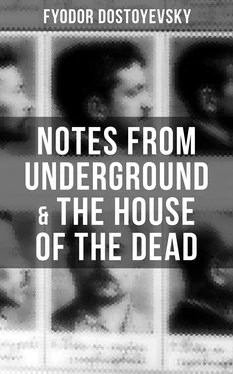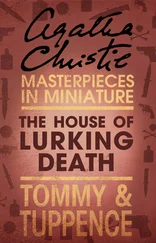I struck up a conversation with him; he became animated, and told me freely how he had been conscripted, how his mother had followed him in tears, and what treatment he had suffered in the army. He added that he had never been able to accustom himself to this life; everyone was severe and angry with him about nothing, his officers were always against him.
‘But why did they send you here-and into the special section above all-eh, Sirotkin?’
‘Yes, Alexander Petrovitch, although I was only one year with the battalion, I was sent here for killing my captain, Gregory Petrovitch.’
‘I heard about that, but I did not believe it; how was it that you killed him?’
‘All you heard was true; my life was insupportable.’
‘But other recruits stuck it well enough. It’s very hard at the beginning, but men get accustomed to it and end by becoming excellent soldiers. Your mother must have pampered and spoiled you. I ‘m sure that she fed you on gingerbread and sweet milk until you were eighteen.’
‘Yes, mother was very fond of me. When I left her she look to her bed and remained there. My life in the army was terrible, and everything went wrong from the start. I was always being punished; but why} I obeyed every order, I was smart and efficient. I didn’t drink or borrow money-it’s all up with a man when he begins to borrow-and yet everyone around me was harsh and cruel. I sometimes hid myself in a corner and did nothing but sob. One day, or rather one night, I was on guard. It was autumn: there was a strong wind, it was so dark you couldn’t see, and I was sad, so sad! I unfixed my bayonet and laid it by my side. Then I put the musket to my breast, and with my big toe-I had taken my boot off-pressed the trigger. It missed fire. I examined it and reloaded it with a charge of fresh powder. Then I broke off the corner of my flint, and once more placed the muzzle against my breast. Again there was a misfire. What was I to do, I asked myself. I put my boot on, fixed bayonet, sloped, and then paced up and down. Let them do what they like, I said to myself; but I will not be a soldier any longer. Half an hour afterwards the captain arrived, making his rounds. He came straight up to me. “Is that the way you carry yourself when you ‘re on guard?” I gripped the musket, and drove the bayonet into him. Then I had to walk forty-six versts. That is how I came to be in the special section.’
He was not lying, but I did not understand how they could have sent him there: such crimes deserve much less severe punishment. Sirotkin was the only one of the convicts who was really handsome. As for his companions of the special section-to the number of fifteen-they were frightful to behold with their hideous, disgusting physiognomies. Grey heads were plentiful among them. I shall speak of these men again. Sirotkin was often on good terms with Gazin, the drink-seller whom I mentioned at the beginning of this chapter.
This Gazin was a terrible man: the impression he made on everyone was confusing or appalling. It seemed to me that a more ferocious, a more monstrous creature could not exist. Yet at Tobolsk I had seen the notorious brigand Kameneff. Later, I saw Sokoloff, the escaped convict, formerly a deserter who was a ferocious creature. Neither of them, however filled me with so much disgust as did Gazin. I often fancied that I had before my eyes an enormous, gigantic spider the size of a man. He was a Tartar, and there was no convict so strong as he. It was less by his great height and his herculear build, than by his enormous deformed head, that he inspired terror. The strangest reports were current about him. Some said that he had been a soldier, others that he had escapee from Nertchinsk, and that he had been exiled several time to Siberia but had always succeeded in getting away. He ended at last in our prison, where he belonged to the special section. It appeared that he used to delight in luring small children to some lonely spot. There he would frighten and torture them, gloat over the terror and convulsions of the poor little things, and finally dispatch them with fiendish glee. These horrors had perhaps been imagined because of the revolting impression that the monster produced upon us; but they seemed probable, and harmonized with his physiognomy Nevertheless, when Gazin was not drunk he conducted himself well enough.
He was always quiet, never quarrelled, avoided all disputes as if from contempt for his companions, just as though he had entertained a high opinion of himself. He spoke very little, and all his movements were measured, calm, resolute. His look was not without intelligence, but its expression was cruel and derisive like his smile. Of all the convicts who sold vodka he was the richest. Twice a year he got completely drunk, and it was then that all his brutal ferocity was laid bare. Little by little he became excited, and began to tease his fellow prisoners with venomous satire thought out long beforehand. At length when he was quite drunk, he had attacks of furious rage, and, seizing a knife, would rush upon his companions. The convicts, who knew his herculean strength, avoided him and protected themselves against him, for he would throw himself on the first person he met. A means of disarming him had been discovered. Some dozen prisoners would rush suddenly upon Gazin, and give him violent blows in the pit of the stomach, in the belly, and generally below the region of the heart, until he lost consciousness. Anyone else would have died under such treatment, but Gazin soon recovered. When he had been well beaten they would wrap him up in his pelisse, and throw him upon his plank bedstead, leaving him to digest his drink. The next day he woke up almost well, and went about his work silent and sombre. Every time Gazin got drunk, the whole prison knew how his day would finish. He knew also, but he drank all the same. Several years passed in this way. Then it was noticed that Gazin had lost his energy, and that he was beginning to weaken. He did nothing but groan, complaining of all kinds of illness. His visits to the hospital became more and more frequent. ‘He is giving in,’ said the prisoners.
On one occasion Gazin had gone into the kitchen followed by the little fellow who scraped the violin, and whom the convicts, during their festivities, used to hire to play for them. He stopped in the middle of the hall, silently examining his companions one after another.. No one breathed a word. When he saw me with my companions, he looked at us in his malicious, jeering way, and smiled horribly with the air of a man pleased with a good joke that had just occurred to him. He tottered over to our table.
‘Might I ask,’ he said, ‘where you get the money which enables you to drink tea?’
I exchanged a look with my neighbour. I realized that the best thing for us was to be silent, and not to answer. The least contradiction would have thrown Gazin in a passion.
‘You must have money,’ he continued, ‘you must have a good deal of money to drink tea; but, tell me, are you sent to hard labour to drink tea; I say, did you come here for that purpose? Please answer, I should like to know.’
Seeing that we were resolved on silence and that we had determined not to pay any attention to him, he ran towards us, livid and trembling with rage. A couple of yards away, he caught sight of a heavy box which ordinarily contained loaves for issue at dinner and supper, and held enough bread for the meal of half the prisoners. At this moment, however, it was empty. Gazin seized it with both hands and brandished it above our heads. Although murder, or attempted murder, was a source of endless trouble for the convicts-examinations, counter-examinations, and inquiries without end would be the natural consequence-and though quarrels were generally cut short when they did not lead to such serious results, yet everyone remained silent and waited.
Читать дальше












